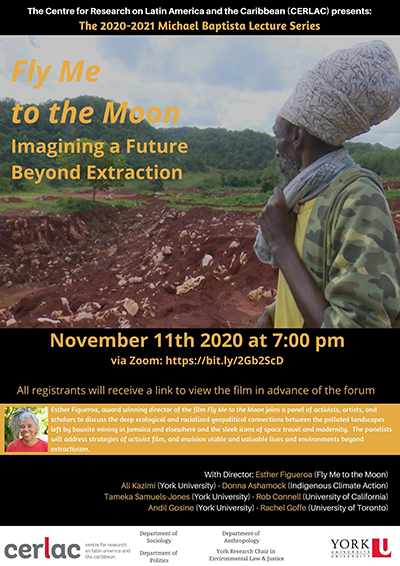
Amid ongoing protests over incursions into Jamaica’s ecological heartland – the Cockpit Country – the timely Jamaican film Fly Me to the Moon tells the stories of Black and Indigenous peoples across the globe whose lands, forests, and rivers have been taken over and made toxic by the aluminum industry. The film examines the deep geopolitical and racialized connections between the polluted landscapes left by bauxite mining in Jamaica (and other Caribbean countries) and the sleek icons of space travel and modernity. Focusing on aluminum's transnational role in reshaping modern transport, warfare and homes, Fly Me to the Moon unravels the toxic realities the of past, present, and future and speaks to the dispossession it has unleashed.
On Nov. 11 at 7 p.m. a panel about this film will make up the first event in the 2020/2021 Michael Baptista lectures, titled "Fly me to the moon: Imagining a future beyond extraction."
The film will be available before and right after the panel for viewing by all those registered for the event. Jamaican director Esther Figueroa will be joined by a panel of activists, artists and scholars, including: award-winning film-maker and York University cinema and media studies Professor Ali Kazimi; Donna Ashamock of Indigenous Climate Action; racism and environmental art scholar Andil Gosine of the Faculty of Environmental and Urban Change at York University; Rachel Goffe, Black dispossession scholar in the Department of Geography at the University of Toronto; and University of California Davis Maroon Ecologies scholar and York alumnus Rob Connell (BA '09). School of Administrative Studies Professor Tameka Samuels-Jones of the Faculty of Liberal Arts & Professional Studies at York University, will introduce the film.
To register for this event, please visit: https://yorku.zoom.us/meeting/register/tJMrd-iurDIqE9Bsao84woCRVLEorwUkHMDK
All registrants will be sent a link to view the film in advance of the forum.
The Michael Baptista Lecture is the annual public event hosted by the Centre for Research in Latin America and the Caribbean (CERLAC). It was established by the friends of Michael Baptista and the Royal Bank of Canada (RBC) to recognize the areas central to his spirit and success: the importance of his Guyanese/ Caribbean roots, his dedication to and outstanding achievements, and his unqualified drive and love of learning.
As a result of COVID-19, instead of a single large public lecture, CERLAC will host a series of online Zoom events that pay particular attention to the struggles of Black and Indigenous communities in the region and their transnational links. The theme of the series is: Alternatives: Creating valuable and viable worlds beyond extractive violence How do we envision, inspire and organize social, political, environmental, economic and cultural alternatives in this moment of extraordinary change? CERLAC will take up this question across disciplines and around themes of extractivism, migration and reparations for enslavement.
CERLAC, one of the oldest organized research units at York University and the first of its kind in Canada, is a hub for inter-and-multidisciplinary research on Latin America and the Caribbean, their diasporas and their relations with Canada and the rest of the world. It provides a meeting space for faculty, students and visitors to discover common interests; supports their projects by facilitating grant administration, partnership formation and the co-production and sharing of knowledge; and trains new generations of regional scholars.
More information on this event can be found on the event posting. A calendar of events hosted by CERLAC can be found on the centre's website.
Originally posted in Yfile
